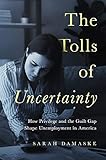The Tolls of Uncertainty : How Privilege and the Guilt Gap Shape Unemployment in America / Sarah Damaske.
Material type: TextPublisher: Princeton, NJ : Princeton University Press, [2021]Copyright date: ©2021Description: 1 online resource (336 p.) : 2 tablesContent type:
TextPublisher: Princeton, NJ : Princeton University Press, [2021]Copyright date: ©2021Description: 1 online resource (336 p.) : 2 tablesContent type: - 9780691219318
- Discrimination in employment -- United States
- Unemployed -- Mental health -- United States
- Unemployment -- United States
- SOCIAL SCIENCE / Sociology / General
- Dorothea Lange
- Great Depression
- SNAP
- UI payline
- childcare labor
- childcare
- chronic unemployment
- economic disaster
- economic recovery
- education
- employment
- food pantries
- full-time work
- gender
- health insurance
- healthcare
- household labor
- housework
- illegal discrimination
- income reduction
- job loss
- labor
- layoff
- lockstep unemployment
- lost jobs
- pink slip
- plant closure
- poverty-level
- recession
- severance
- sick days
- transitory unemployment
- unemployment benefits
- unemployment insurance
- unemployment rate
- women and work
- working class
- 331.13/70973 23
- HD5724 .D323 2021
- online - DeGruyter
| Item type | Current library | Call number | URL | Status | Notes | Barcode | |
|---|---|---|---|---|---|---|---|
 eBook
eBook
|
Biblioteca "Angelicum" Pont. Univ. S.Tommaso d'Aquino Nuvola online | online - DeGruyter (Browse shelf(Opens below)) | Online access | Not for loan (Accesso limitato) | Accesso per gli utenti autorizzati / Access for authorized users | (dgr)9780691219318 |
Browsing Biblioteca "Angelicum" Pont. Univ. S.Tommaso d'Aquino shelves, Shelving location: Nuvola online Close shelf browser (Hides shelf browser)

|

|

|

|

|

|

|
||
| online - DeGruyter Earthly Delights : Poems / | online - DeGruyter The Spectre of War : International Communism and the Origins of World War II / | online - DeGruyter The Trials of Orpheus : Poetry, Science, and the Early Modern Sublime / | online - DeGruyter The Tolls of Uncertainty : How Privilege and the Guilt Gap Shape Unemployment in America / | online - DeGruyter The Rhetoric of Leviathan : Thomas Hobbes and the Politics of Cultural Transformation / | online - DeGruyter The Door in the Sky : Coomaraswamy on Myth and Meaning / | online - DeGruyter The Power of Separation : American Constitutionalism and the Myth of the Legislative Veto / |
Frontmatter -- contents -- Preface -- Introduction -- part I. losing a job -- 1 Job Loss in the Twenty-First Century -- 2 The Paths to Job Loss -- 3 The Ax Falls -- part II. the fallout -- 4 Insecurity after the Job Loss -- 5 The Guilt Gap and Health -- 6 The Guilt Gap and the Second Shift -- part III. the search -- 7 Attempting to Return to Work -- 8 One Year Later -- Conclusion: Uncertainty in the Heartland -- Acknowledgments -- Methodological Appendix -- Notes -- Bibliography -- Index -- Index of Participants
restricted access online access with authorization star
http://purl.org/coar/access_right/c_16ec
An indispensable investigation into the American unemployment system and the ways gender and class affect the lives of those looking for workThrough the intimate stories of those seeking work, The Tolls of Uncertainty offers a startling look at the nation’s unemployment system—who it helps, who it hurts, and what, if anything, we can do to make it fair. Drawing on interviews with one hundred men and women who have lost jobs across Pennsylvania, Sarah Damaske examines the ways unemployment shapes families, finances, health, and the job hunt. Damaske demonstrates that commonly held views of unemployment are either incomplete or just plain wrong. Shaped by a person’s gender and class, unemployment generates new inequalities that cast uncertainties on the search for work and on life chances beyond the world of work, threatening opportunity in America.Following in depth the lives of four individuals over the course of their unemployment experiences, Damaske offers insights into how the unemployed perceive their relationship to work. She reveals the high levels of blame that women who have lost jobs place on themselves, leading them to put their families’ needs above their own, sacrifice their health, and take on more tasks inside the home. This “guilt gap” illustrates how unemployment all too often exacerbates existing differences between men and women. Class privilege, too, gives some an advantage, while leaving others at the mercy of an underfunded unemployment system. Middle-class men are generally able to create the time and space to search for good work, but many others are bogged down by the challenges of poverty-level unemployment benefits and family pressures and fall further behind.Timely and engaging, The Tolls of Uncertainty posits that a new path must be taken if the nation’s unemployed are to find real relief.
Mode of access: Internet via World Wide Web.
In English.
Description based on online resource; title from PDF title page (publisher's Web site, viewed 01. Dez 2022)


